Each time a new school year starts, three groups of people experience familiar anxiety: students, teachers, and parents. Though their concerns may differ, all those groups are dealing with the same situation. Like any other aspect of life, education is not immune to constant changes; it is spurred by shifts in expectations, demands and new theories related to education. Trends are emerging all the time.
Australia is no exception and nor is 2019. Technological development is still having a great influence on the state of education, but other fields are also playing increasingly dominant roles. So, what can you expect to happen in Australia this year that is relevant to education?
Mindfulness and mental health
For quite some time now, experts have claimed that we should be doing more in terms of improving the mental health of students and their mindfulness. Many avant-garde educational institutions are already using various apps, activities, and techniques, such as meditation, to help their students mentally prepare for academic success.
While there are still many people who are skeptical about these methods, we cannot deny that the number of teachers practicing mindfulness, for example, has been rising constantly and that the response from their students has been overwhelmingly positive. Whether the results in the future will be equally encouraging remains to be seen. However, there’s no arguing that students are feeling more open and ready to embrace educational challenges.
Teachers learn more than ever

It’s said that teachers are among those who have to learn the most, in order to cope with the challenges of having to work with students. This is because student interests have shifted dramatically, meaning that some students don’t necessarily respond to traditional ways of learning. Not only do teachers have to invest more time and effort in their professional development, but they too have to use new ways of learning and develop new skills constantly.
Australian teachers are also expected to embrace weekly goal-setting. This involves students filling out online feedback forms and the teacher’s superior conducting more frequent “walk-throughs” to observe the classroom. The pressure is higher than ever and teachers working in Australia are doing their best to manage it in the best possible way.
More diversity and competition
Since Australia is one a country that attracts many people from all over the world each year in pursuit of their happiness, the demographics of the student population can also be expected to continue to change. That means that more and more young people from overseas will seek educational opportunities afforded by Australian secondary and tertiary facilities. Consequently, it might be more difficult to obtain important high school scholarships.
While the criteria might not change dramatically, it is safe to assume that the competition will be tougher and that you need to analyse your options well in advance. A late submission simply can’t happen anymore. Luckily, there are many options, but they are available only to those who prove they deserve it.
Technology and more technology

While many parents still struggle with their children when it comes to the use of gadgets and technology, Australian schools continue to use modern technology more and more. Though it doesn’t come cheap and not everyone accepts it gladly, technology has proven that it has a positive impact on education, if used properly. What we might expect this year is even more virtual classrooms, gamification and online modules, which is particularly great for students living in rural areas, far from schools. Language learning has also embraced this method, as the number of online courses of this kind continues to rise.
Some more advanced institutions might rely more on chat bot software, while younger students might face the introduction of physical robots, which is supposed to spark their innate curiosity and willingness to experiment. Finally, online tests and automatic essay grading will continue to be adjusted and improved.
The educational system in Australia is among the most appreciated and highly-valued sectors in the world and there is a good reason for that. The curricula and syllabus are relevant and modern, while teachers are motivated and ready to accept inevitable changes. Moreover, the Australian government continues to provide significant funding in education, meaning it comes as no surprise that more and more people are pursuing their academic careers here.

